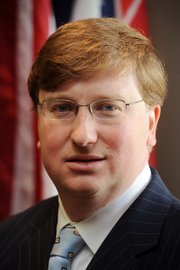Unfortunately, most of the politicians who spoke at the Neshoba County Fair two weeks ago didn't publish their speeches.
Then again, if you heard one Mississippi Republican's speech, you've likely heard a version of all of them. With the lone exception of Attorney General Jim Hood, every executive and legislative branch head is a member of the Grand Old Party.
At this year's fair, Republicans touted the success of the party's legislative agenda, which included passing a charter-school bill, a third-grade reading program and more. Lt. Gov. Tate Reeves, or the fearless leader of the "Tater Tots," was the only pol kind enough to make available the full text of his speech, so we'll use that as our guide to determine whether legislators are doing everything they claim they are.
Claim: "Over the past two years, the Legislature increased funding for K-through-12 public education by more than $83 million."
The Legislature has allocated more money for public education the past couple of years, primarily to pay pension obligations. Despite the increase, a large gap persists between what the Legislature allocated and what the Mississippi Adequate Education Program formula mandated. Specifically, the gap between MAEP and the amount lawmakers budgeted for education in Mississippi this year is approximately $264 million. And, because the Legislature has failed to fully fund MAEP since 2009, the total that lawmakers have shorted Mississippi schools is around $1.3 billion.
Claim: "Mississippi took its first steps toward giving parents a choice in where their children attend schools. For the first time, public charter schools will be allowed to open in school districts rated D or F. And public charter schools can open in districts rated A, B, or C—as long as the local school board does not block what parents demand. We are putting parents in charge ... and we are just getting started."
After many years of trying and failing, the Mississippi Legislature finally passed a bill to clear the way for charter-school expansion during this year's session. The champions of this effort, mostly Republicans and a smaller number of Democrats, routinely tout charter schools as "another tool in the box" for giving parents choices to improve educational outcomes for their children.
True, charter schools can be a tool for some parents and kids, assuming they're lucky enough to earn admission to a charter school. Legislators projected that only a handful of charter schools will operate in the state in the first few years. The law requires the schools to hold lotteries to randomly select students for the few slots to eliminate cherry-picking of certain kids.
A February 2013 Reuters investigation into charter-school admission practices revealed that some charter schools, which are funded by public money but run by private organizations, come up with ways to get only the students most likely to perform well academically. The tactics include:
• Lengthy application forms, often printed only in English, that require student and parent essays, report cards, test scores, disciplinary records, teacher recommendations and medical records.
• Demands that students show Social Security cards and birth certificates for their applications to be considered, even though such documents cannot be required under federal law.
• Mandatory family interviews.
• Assessment exams.
• Academic prerequisites.
Claim: "The Legislature created a 'Third-Grade Gate' meaning a child will have to read proficiently in the third grade before passing to the fourth grade."
Borrowed from former Florida Gov. Jeb Bush's educational foundation, the third-grade gate was a centerpiece of the Republican education-reform agenda. Under the program, children must read at grade level before promotion to the fourth grade or be held back. Repeating students will receive special instruction from tutors and coaches.
Gov. Phil Bryant proposed spending $15 million to hire 75 literacy coaches for the state's kindergarten through third grades; however, the Legislature slashed Bryant's request to $9.5 million, and the Mississippi Department of Education will only hire 24 reading coaches for the entire state, even though hundreds applied.
Claim: "When tragedy struck that schoolhouse in Newtown, Connecticut, what was the first reaction by President (Barack) Obama and Congress? To take away your right to own guns and protect your family!"
Gun supporters often spin proposed firearm regulations as an attempt to strip all guns from everyone. That brand of hyperbole is evident in Reeves' statement. After the December shooting at Sandy Hook Elementary, when 26 children and adults were killed, Obama called for more extensive background checks on gun purchasers as part of a gun-control overhaul. Congressional Senate Democrats drafted a bill, but it failed to earn a filibuster-proof majority and eventually died.
Claim: "The Legislature also clarified Mississippi's law regulating your ability to carry a concealed weapon. Last year, General Hood issued an opinion that folks whose concealed weapon became visible were violating the law. So, if you were walking down the street on a windy day and your coat blew back to reveal a gun, you could be in violation of the law."
Technically, House Bill 2, otherwise called the concealed-carry bill, clarified the ability to openly carry a weapon. Mississippi law requires individuals to obtain a permit to carry concealed weapons, but gun-rights advocates said the law was unclear on the definition of "open" and "concealed." HB 2 was an attempt to make the law more clear, but seems to have done the opposite. In June, law-enforcement officials in Hinds County sued to block the law's implementation until the legislature could address key questions. A Hinds County judge agreed and issued an injunction that called the law "constitutionally vague." The matter is awaiting action from the Mississippi State Supreme Court.



Comments